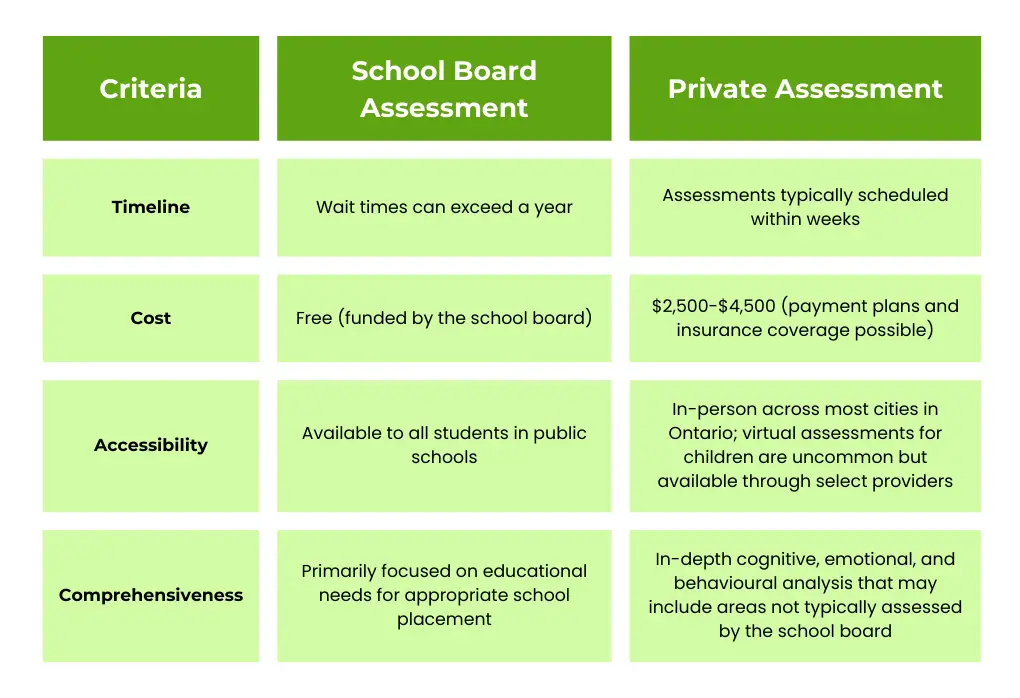Identifying learning difficulties early can make a significant difference for school-aged children struggling to meet their learning goals. For families navigating this path, seeking an assessment is the first step toward improving their child’s educational outcomes. In Ontario, families typically choose between learning disability assessments provided by the school system, often through an Identification, Placement, and Review Committee (IPRC), or a private psychoeducational assessment with a licensed mental health professional who specializes in developmental and learning disorders.
While both paths aim to support academic achievement and address specific learning disabilities, the wait times, costs, and scope of the assessments vary significantly. This blog will break down and compare school board and private assessments to help you understand which option will suit your child’s learning needs best.
School Board Assessments: The IPRC Process
School boards use the IPRC assessment process to evaluate whether a student has special needs and requires a special education program. At an IPRC meeting, members will discuss the student’s performance and review relevant documentation, like curriculum-based assessments and test scores. With parental consent, the IPRC will appoint qualified professionals to administer educational, health, or psychological assessments if they feel that it is required to make a correct identification or placement decision.
Following a discussion of the student’s learning needs and assessment results, the committee will decide whether to identify the student as exceptional and, if so, recommend an appropriate program. The school board will notify the school where the special education program will be provided so they can develop the student’s IEP (Individual Education Plan).
While the cost of assessments is covered through the public education system, due to high demand and limited staffing, the evaluation process may take several months to over a year, or even longer with some school boards. Additionally, these assessments aim to support academic achievement and placement decisions. As such, the evaluation of cognitive abilities and behavioural or emotional challenges may not be as extensive as in a private assessment for learning.
Private Assessments: A Personalized Path
For families seeking a faster, more detailed evaluation, private psychoeducational assessments provide an in-depth view of a student’s cognitive ability, academic skills, and emotional well-being. These assessments address some psychiatric conditions and specific learning disorders such as dyslexia and dyscalculia, alternatively labelled as specific learning disorders in reading, writing, and/or math. Private psychoeducational assessments also assess for or rule out giftedness and developmental disabilities such as Attention Deficit Hyperactivity Disorder (ADHD) or Attention Deficit Disorder (ADD). More specialized private assessments will also assess for Autism Spectrum Disorder (ASD) and global developmental delay.
The general process includes intake interviews to collect a detailed history, as well as standardized testing that explores:
- Intellectual functioning and adaptive functioning
- Oral language processing and nonverbal information processing
- Visual-spatial processing and sensory impairments
- Social skills and emotional and behavioural functioning
A written report containing the relevant diagnoses and recommendations for accommodations in both classroom and home settings will be provided after the assessment. This roadmap is tailored for each patient’s specific needs and supports the development of an effective Individual Education Plan or Independent Education Plan (IEP).
Private assessments come at a cost. Families can expect to spend between $2,500-$4,500 in Ontario, depending on the provider. However, in many cases, flexible payment plans are available, and documentation will be provided for reimbursement through insurance. These assessments often provide the advantage of faster access. Some private facilities are scheduling within 2 to 4 weeks, which means quicker implementation of learning strategies through more immediate formal testing. It should be noted that some private assessment facilities also have lengthy waitlists similar to the school boards.
School Board vs. Private Assessments: A Side-by-Side Comparison
To help parents and educators better understand the two approaches, here’s a simple breakdown of key differences:

Making the Right Choice for Your Child’s Learning Needs
Whether you choose the school board route or a private provider, the goal remains the same: to identify learning challenges and improve your child’s academic outcomes. Early identification followed by early intervention is essential, particularly when addressing a complex learning or intellectual disability. If you’re ready to explore next steps, consider reaching out to a local school psychologist, school staff, or your child’s classroom teacher to learn more about the types of assessments available.
You can also reach out to Edcommodate for a no-pressure conversation about the private assessment of students. We’re one of the few providers in Ontario offering virtual assessments for children aged 8 and up. Thorough, in-depth, and available without wait times – our evaluations help you gain a clearer, more complete understanding of how your child learns.
